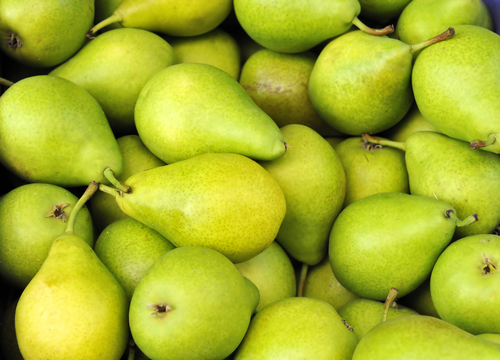Short answer
Pears are a wonderful addition to any diet as they contain a good amount of dietary fiber.
Very healthy and numerous health benefits. A few harmful qualities may be associated, but only under certain circumstances such as an allergic reaction.
View Full Grading System
Category 'A'
Very healthy and numerous health benefits. Side effects are rare. Things rated an 'A+' are typically necessary for survival (for example, water).
Very healthy and numerous health benefits. A few harmful qualities may be associated, but only under certain circumstances such as an allergic reaction.
Very healthy and numerous health benefits. Harmful qualities may be associated, but aren't usually serious.
It is important to note that even the best things in life can become bad in immoderate amounts. So, although something may be rated an 'A+', overconsumption/overdoing can bring unwanted effects.
Category 'B'
Very beneficial to your health. Things rated a 'B+' may have a few harmful qualities to pay attention to.
Overall beneficial to your health. Things rated a 'B' may have some harmful qualities to pay attention to.
More beneficial to your health than not. However, harmful qualities are most likely associated and shouldn't be overlooked.
The main difference between category 'A' and category 'B' is the harmful qualities typically present in 'B' items. Serious side effects are usually uncommon, but are still possible and should be taken note of.
Category 'C'
Both beneficial and harmful qualities associated. Things rated a 'C+' are typically a bit more on the beneficial side. Still, moderation is important.
A fairly even ratio of beneficial and harmful qualities. Moderation is important. Very general topics that can lean towards both sides of the spectrum will be placed here as well. Rice, for example, can be good or bad depending on the type.
More harmful than beneficial. Side effects are common, especially when consumed/done excessively. Moderation is very important.
Category 'C' usually denotes to both good and bad qualities. When it comes to this category, it is important to keep this word in mind: moderation.
Category 'D'
Harmful to your health. Although benefits may be associated, the bad most likely outweighs the good. Moderation is very important.
Harmful to your health. A few benefits may be associated, but the bad outweighs the good. Moderation is extremely important.
Harmful to your health. Very few, if any, benefits are present. Things in this category should be avoided as much as possible.
Category 'D' is typically for things that are more harmful than beneficial. While consuming/doing something unhealthy once in a blue moon shouldn't hurt, we definitely recommend eliminating 'D' items as a regular part of your routine/diet.
Category 'F'
Category 'F' is for things that fail to bring anything beneficial to the table, and are very harmful to your health. We recommend completely avoiding anything in this category. Long-term side effects of 'F' items are usually very serious.
Category 'N'
'N' stands for neutral. Things placed into this category are generally (a) neither good nor bad for you, or (b) lack the necessary evidence to reach any conclusions.
Long answer
There's something so satisfying about biting into a sweet, juicy pear. And not only do your taste buds appreciate it, but your body does as well. Pears are a fantastic source of dietary fiber when eaten with the skin. One pear has about 23% of your daily recommended intake (the skin contains half of this!), and it is this nutrient which makes pears such a wonder food.
Fiber is important for a variety of reasons. For one, it keeps you feeling fuller for longer without weighing you down or making you pack on unwanted pounds. Because of this, pears can assist with healthy weight loss due to their fiber content and relatively low calorie count-- roughly 100 calories per medium-sized pear. It can lower blood pressure and cholesterol levels, and prevent constipation to help encourage regularity. Fiber also keeps blood sugar stable. Because pears' fiber isn't broken down or digested by the body, it does not affect blood sugar levels and can, therefore, play an important part in diabetes prevention and management.
However, you may be put off of pears if you suffer from irritable bowel syndrome. Too much fiber can worsen the symptoms of IBS, including bloating, diarrhea, and gas. It can also cause similar symptoms in people without IBS if they are over-consumed. If you are concerned about potentially having to make a quick dash to the restroom, you may want to avoid eating a large amount of this fruit. Otherwise, enjoy pears in moderation and you will experience nothing but positives!
Possible short-term side effects
- worsen symptoms of irritable bowel syndrome
-
diarrhea
Ingredients to be aware of
Benefits
- lowered risk of diabetes, cancer, heart disease and hypertension
-
can assist with healthy weight loss
-
increased regularity
-
stabilizes blood sugar
-
lowers blood pressure and cholesterol levels
Please turn your Ad Blocker off to see this content. Thank you!
Thank you for your feedback!
Written by Lindsay
Published on: 02-18-2016
Last updated: 12-10-2016
Thank you for your feedback!
Written by Lindsay
Published on: 02-18-2016
Last updated: 12-10-2016

 Approved by
Approved by 















